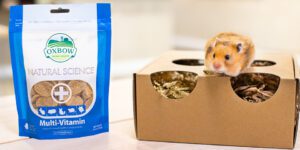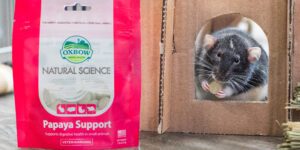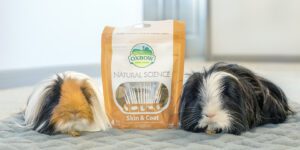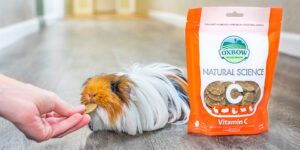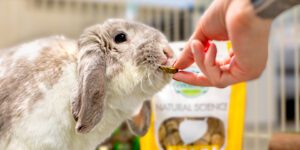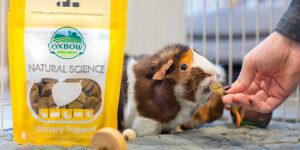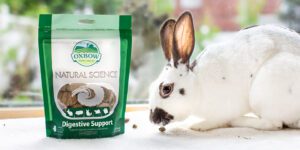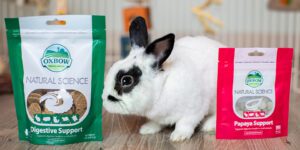Author: Dr. Cayla Iske, PhD
Updated: March 22, 2024
Natural Science Skin & Coat was formulated to help reduce inflammation and irritation of the skin and to aid in maintaining healthy haircoats in small mammals.
While it may seem that healthy skin and coat are not atop the list of things to be concerned about, it is important to remember that the skin is one of the most important organs in the body and serves a variety of essential functions.
Therefore, preventing and minimizing inflammation and irritation of the skin is important as it can mitigate larger health issues, in addition to avoiding discomfort for your little one.
Bathing small animals is not typically recommended unless targeting a specific disease, so maintenance of the skin and coat comes almost entirely from the diet and balancing proper nutrients.
Overview of Skin and Coat Health
Healthy skin and coat are not only important for appearance but serve the following important functions of protecting your pet:
- The haircoat and skin of an animal is the first line of defense in protection against outside environmental factors such as wind and sun, and also against microorganisms like bacteria and toxins.
- Issues with the skin and coat increase the likelihood that pathogens may cause external issues for your pet, possibly leading to more significant internal issues.
- The skin plays a vital role in providing a physical barrier as part of the immune system.
- Keeping the skin lubricated and free of inflammation facilitates proper thermoregulation and hydration, and allows a healthier coat to develop and grow. The skin and fur work in tandem to maintain each other in this way.
The Role of Diet in Skin and Coat Health
Nutrition plays a huge role in the health of skin and coat, especially in small mammals. In lieu of water baths or topical applications, a complete and balanced diet including ample hydration is the best way to provide maintenance and support.
Adequate dietary protein and proper amino acid balance allow for growth of strong, healthy fur and ample amounts of fiber allow the digestive tract to function properly.
Fats and oils found in high-quality diets play a direct role in maintaining skin and coat health. In particular, omega fatty acids as well as other antioxidants support overall skin health and well-being by reducing swelling and inflammation of the skin to provide a healthy barrier and allow for growth of a shiny, strong coat.
Dietary imbalances and/or underlying medical issues often first manifest as changes in the haircoat or skin appearing as a thin, dull coat or flaky skin. This serves as a good indicator for pet parents, so it is important to always monitor the health and appearance of their pet’s skin.
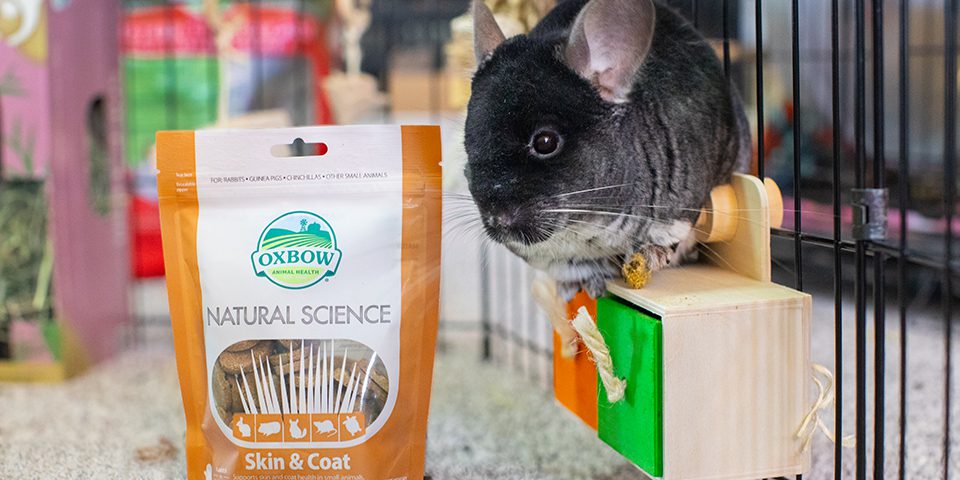
Could My Pet Benefit from Natural Science Skin & Coat?
Offering an appropriate diet (this includes hay, pellets, greens/veggies, treats, water, and supplements) is the single most important health decision any pet parent can make.
A well-balanced diet including ample amounts of fiber from hay, hydration from fresh free choice water, micronutrients from a uniform pellet, and powerful antioxidants from fresh produce is the basis for supporting your pet’s overall health and wellbeing.
Even with a proper diet, there are times when animals have skin and coat issues and would benefit from a specific supplement tailored towards skin and coat health. This may include:
- History of skin or coat issues
- Allergies
- Dermatitis (inflammation of the skin)
- Any condition causing pruritus (itchy skin)
- Bacterial or fungal infection affecting the skin
- Alopecia (hair loss)
- Dull, dry hair coat
- Skin mites
For more information about skin and coat diseases, and how to treat the underlying issues that cause them, read more on our blog about how to keep your small pet’s skin and coat healthy.
Because skin and coat issues are commonly the result of underlying health concerns, it is imperative that you work with your exotics veterinarian if you observe any of the above symptoms. They should perform a full physical examination and possibly tests to determine root causes and best treatments, which may include Natural Science Skin & Coat to help alleviate these issues.
Is Natural Science Skin & Coat Appropriate for Omnivores?
Skin and coat issues can occur in all small mammal species and our Skin & Coat supplement can support omnivores as well as herbivores.
A balanced and high-quality diet including plenty of supplemental proteins and fats is vital for small omnivores such as rats, mice, hamsters, and gerbils but Natural Science Skin & Coat will fit nicely into their diet when appropriate and under the guidance of your veterinarian.
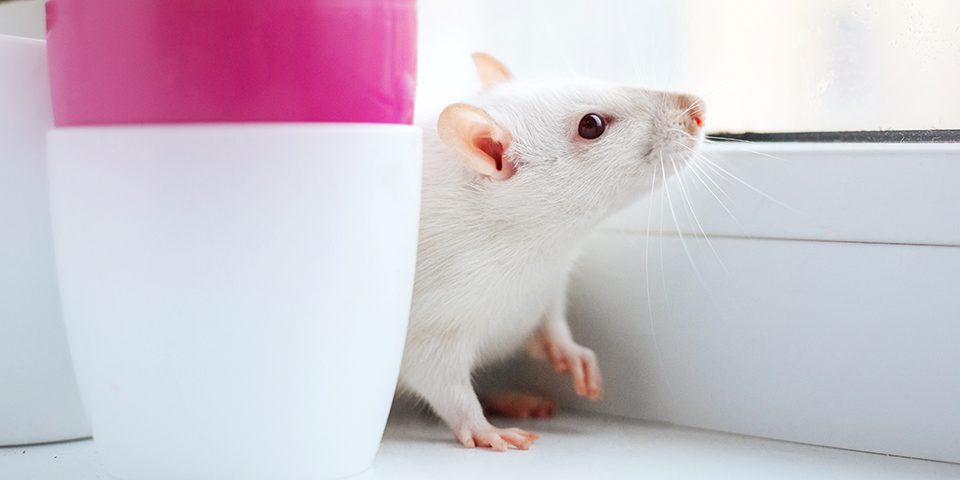
Ingredient Functionality
Our Skin & Coat supplement was formulated specifically for small mammals, so it is hay-based, high in fiber, and avoids high-starch, sugary ingredients that are inappropriate for the unique digestive systems of these species.
It was also formulated to include a large diversity of natural antioxidants and anti-inflammatory ingredients to reduce swelling and promote overall health to maintain your pet’s skin and coat.
| Ingredient | Nutrient | Function |
|---|---|---|
| Timothy Grass | Insoluble Fiber | Promotes a healthy gastrointestinal tract to maintain overall health |
| Flaxseed Meal | Omega Fatty Acids | Anti-inflammatory to maintain soft fur and healthy skin |
| Chamomile | Terpenoids & Flavonoids | Anti-inflammatory with anti-allergic properties to help reduce itching and scratching |
| Brewer’s Dried Yeast | Manna Oligosaccharide (MOS) | Acts as a prebiotic and promotes the growth of healthy bacteria for whole body health |
| Palm Oil* | Omega Fatty Acids & Beta Carotene | Antioxidative properties to help fight against cell damage and support overall healthy skin and coat |
| Canola Oil | Omega Fatty Acids | Anti-inflammatory to mitigate swelling and promote healthy skin and coat |
*We utilize a Roundtable on Sustainable Palm Oil (RSPO) and Fair-Trade Certified source of palm oil to ensure ingredient sustainability and environmental protection.
Daily Feeding Recommendations
Herbivores (rabbits, guinea pigs, chinchillas, etc.)
- 1/2 to 2 tabs daily (varies by weight)
Omnivores
- 1/8 tablet daily for smaller species such as dwarf hamsters and mice
- 1/4 tablet daily for larger species such as Syrian hamsters, gerbils, and rats
Supplement FAQs
Can Natural Science Skin and Coat be fed to young, growing, pregnant, or nursing small animals?
Our Skin and Coat Supplement is not intended for young, growing, pregnant, or lactating small animals. Please work with your veterinarian to find alternatives to our supplement if your pet falls into any of these life stage categories.
Other FAQs
Many questions that come to mind when considering whether or not to add supplements to your little one’s diet. When evaluating the use of Oxbow’s Natural Science supplements either for the short or long-term, refer to our supplement FAQ blog to answer some common questions.
Remember, you should work with your veterinarian to evaluate your pet’s overall health as well as any medications they may be taking. Both health status and current medication should factor into the decision of adding any kind of supplement to your pet’s diet.

